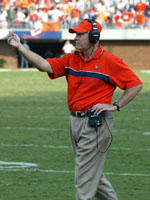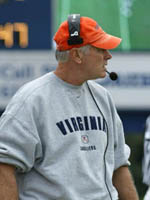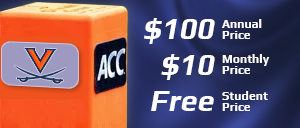 |
|
Al Groh has a 30-21 record in four years as UVa’s coach. |
We’re about to enter the fifth season of the Al Groh era in Virginia football. What better time to take a close look at the program and analyze what happened the past four years, where things stand now and the outlook for the future?
For one thing, 2005 will mark the first season that the Cavaliers play with a roster full of Groh’s recruits. In that sense, it’s the first team that is all his. But already he’s put his stamp on the program in numerous ways – offense, defense, special teams, attitude, discipline, recruiting, etc. We’ll examine all of those things and also look at how the fan base and the culture of UVa football have changed. Most importantly, we’ll try to show the challenges that still need to be met in order to fulfill Groh’s championship aspirations.
To be sure, now is an interesting time for Groh and his program. Hired on Dec. 30, 2000, after resigning as head coach of the New York Jets, Groh made a big splash when he came to UVa, talking about competing at the highest level, winning championships and doing it the right way (no cheating, respecting academics, etc.)
That was exactly what Wahoo fans had longed to hear. While any sensible fan appreciated George Welsh’s accomplishments in his 19 years on the job, many were frustrated at a program that had stagnated, if not stumbled, at the end of the century. In Al Groh, here was a coach who wasn’t reticent about striving for greatness, who promised to take the Cavaliers to the next level, and whose confidence made others believe that such success was not only possible but probable.
Four years later, have those lofty goals been reached? Well, yes and no. To be sure, there have been some major accomplishments in Groh’s tenure.
At the same time, the 2004 season, despite eight lopsided wins, was a letdown in some respects. The Cavs lost all three of their games against ranked opponents (FSU, Miami and Virginia Tech) as well as the MPC Computers Bowl to Fresno State. A 5-0 start and No. 6 ranking unraveled during a 3-4 finish and plunge in the polls.
It was the first poor November-December stretch by the ‘Hoos under Groh and it undeniably affected the perception of Virginia as an up-and-coming program. The same pundits who praised Groh for getting the most out of little talent in 2002 and 2003 now criticize him for underachieving with considerable talent.
Even many UVa fans have ended the honeymoon. Just check out the Sabre message boards over the past nine months. More fans have been skeptical or critical of Groh’s schemes, coaching style and recruiting strategy. Fewer seem as certain that the Cavs are destined for championships, especially in the expanded ACC. Virginia Tech’s title in its inaugural ACC campaign only caused more frustration and grumbling in Hooville. The natives are restless, or at least a bit anxious, and who can blame them?
No doubt about it: The 2005 season represents something of a crossroads.
 |
|
Groh has established lofty goals for Virginia’s program. |
After all, Groh and his “tribe” may be in charge here for many more years, but the end isn’t out of sight. Groh turned 61 last Thursday, and though he still seems to have boundless energy, enthusiasm and fire, he isn’t a 40-something coach looking to build a respectable program and advance his career. As Groh says, this is his last stop. He intends to win big here. And he wants to do it now.
So, given that reality, it’s imperative that Groh regain the good vibes that surrounded his program for three years. Much of that momentum was lost at the end of last season. Another year without a big win, more disappointing road trips, a loss at home to Virginia Tech…those could send the program into a downward spiral, or at least create the perception of stagnation. Once that happens, it’s hard to recover, it’s hard to recruit and it’s just about impossible to win championships in the near future.
Then again, if the Cavaliers can surpass expectations, win a few big games (especially vs. the Hokies) and contend for the ACC crown this year, that will go a long way toward restoring the faith of the fan base and the attention of marquee recruits. Results on the field are of paramount importance this season, perhaps more so than at any time in Groh’s tenure at UVa.
Which, once again, makes this a good time to explore all facets of the Virginia football operation over the next seven weeks in this “State of the Program” series. Among the topics we’ll discuss:
The Offense
The Defense
The Special Teams
The Intangibles
Recruiting
The Fans
 Your input is also welcome. Feel free to e-mail me at [email protected] and offer your thoughts, feedback and ideas for any part of this series.
Your input is also welcome. Feel free to e-mail me at [email protected] and offer your thoughts, feedback and ideas for any part of this series.
What’s the point? I’m not arrogant enough to think I know better than Coach Groh and his staff when it comes to pinpointing problems and finding answers. This stuff is his job and his life. But if nothing else, I hope that this series of articles makes for interesting reading and stimulates some good discussions on the message boards. At the very least, it will make the offseason go by a little faster, no?
(This article is free, but subsequent “State of the Program” stories will be exclusively for Edge subscribers. To join, please click this link to learn more or sign up for Sabre Edge.)



